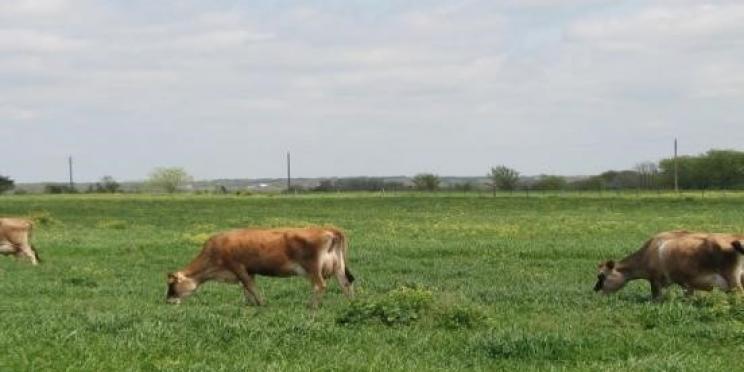ABCD project helps farmers reduce their carbon footprint
25/06/2023

Interreg France (Channel) England project ABCD trialled a new diet for dairy cows demonstrating that it has the potential to help farmers reduce their carbon footprint by 10%.
Agriculture is essential to our food supply and a key economic sector for Cornwall and Finistere, however, carbon emissions are significant at 23% and 32% respectively.
These emissions contribute to climate change and as the EU and UK have set targets to reduce carbon emissions by 55% and 68% respectively by 2030, it is essential to find solutions to help sectors reduce their emissions.
ABCD, led by the Department du Finistere in partnership with Cornwall Council and the Chamber of Agriculture of Brittany, worked with farmers at two pilot sites in England and France to reduce carbon emissions.
Soybean is recognised for supporting high milk yields in dairy cows. However, it is becoming less popular with milk processors, consumers and dairy farmers for many reasons. Environmental concerns around how imported soybean is produced, a desire to reduce the carbon footprint of milk, and pressure from milk buyers means that farmers are looking at alternatives.
At Duchy College’s Future farm in Cornwall, a trial was designed to evaluate the effects of soya and soya -free diets on dairy performance.
The team carried out the trials in October 2022 and January/February 2023 with cows from a 196-head herd, block-calved from August to October. They used two groups of 62 cows in the trial. These were balanced by parity and predicted milk yield (butterfat and protein), were milked twice a day and fed five times a day using an automated robotic feeding system (Trioliet).
Concentrate blends were formulated with or without soya, with equivalent levels of crude protein (22.3%), metabolisable energy (14.8MJ ME/kg) and fibre (5.11%). Where soya was excluded from blends, rapeseed meal was used instead.
Paul Ward, Research and Programme Manager at Duchy College, said: “Milk production, milk quality and body condition scores were unaffected with a ration containing no soyabean meal, compared with a diet containing soya.
“Using this soyabean meal-free ration was estimated to deliver a significant reduction of 80g/litre of milk CO2e (8.6%) in carbon footprint.
“Assuming the herd was making progress on other measures like improved fertility, first calving optimisation, better health and use of home-grown protein, total carbon footprint would fall by 10%,” said Mr Ward. But longer-term research is needed to confirm the estimates.”
At Trévarez farm in Finistère, farmers are already using rapeseed-based concentrates, and the benefit of rapeseed is that it can be home-grown, reducing the dependence on long supply chains. However, the team are continuing to explore alternatives to soya and through project ABCD they trialled a meal ration based on grass silage and maize cob silage (treatment) compared to a ration based on maize silage with a little grass silage (control), the aim being to reduce concentrates as much as possible.
They found that the carbon footprint of the treatment ration wasn't better than that of the control ration, however, the team expect that if concentrates had been soya based there would have been an improvement. The simulation for this will be published towards the end of 2023.
ABCD project also supported producers in adopting new low carbon practices on farm. As part of a knowledge exchange activity, 15 farmers from Cornwall visited farms in Brittany in August 2022, and 12 French farmers visited Cornwall in June 2022.
Martin Alvey, Vice President of Environment and Climate Change, Cornwall Council, said: “By participating in the ABCD project, the historical partnership between Finistère and Cornwall continues to be strong and forward-looking. With economically significant dairy sectors in both areas and a shared interest in reducing carbon emissions, it made total sense for both our territories to join forces in ensuring that farming is part of the solution against climate change instead of being pointed at as a cause.”
Jacques Gouérou, Vice President, Economy, Finistère County Council, said: ““We firmly believe that agriculture has a future and that it is our duty to maintain this sector which employs many Finisterians. With this in mind, we will continue to strengthen our support and accompany the transitions in order to promote a high quality and sustainable agriculture anchored in its territory.”
The micro project ran from March 2021- March 2023 and had a budget of €500,000, of which €400,000 was ERDF.
More information:
The results of the project’s activities can be found here:
